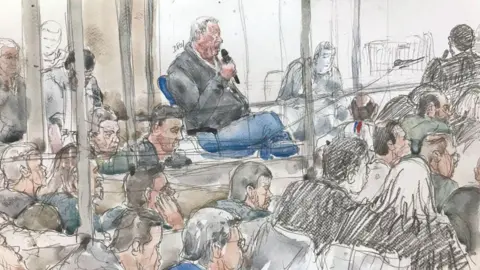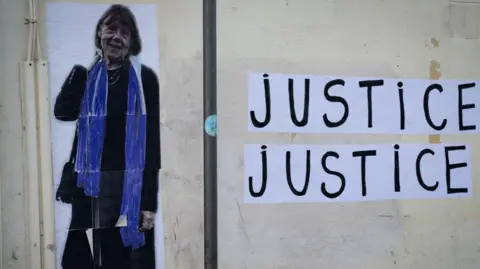 CLEMENT MAHOUDEAU/AFP
CLEMENT MAHOUDEAU/AFPJudges in the French city of Avignon will hand down verdicts Thursday against 51 men in a mass rape trial that made a 72-year-old woman a feminist icon.
Gisèle Pelicot was drugged for almost a decade by her ex-husband Dominique, who then invited dozens of men he recruited online to have sex with her in her bed at home while she was unconscious and unconscious.
It was her decision to forego her anonymity and take this trial public – in her words, allowing “the sides of shame” to switch from victim to rapist.
Although he admits the allegations against him, most of the other men on trial deny that what they did was rape.
Prosecutors asked for prison sentences of between four and 20 years, the maximum penalty for an aggravated rape charge.
One of the defendants, who admitted the charges, said the trial was rushed and “botched.”
Activists say this case proves that in France, as in other European countries, consent must be built into rape laws.
What is this case about?
From 2011 to 2020, Dominique Pelicot administered sedatives and sleeping pills to his wife without her knowledge, crushed them into powder and added them to her food and drink.
Gisèle Pelicot suffered from memory loss and fainting spells due to the drugs and has spoken of losing ten years of her life.
He was eventually caught after a security guard reported him to the police for taking photos up women’s skirts in a supermarket.
“I thought we were a close couple,” she once told the court. Instead, on a notorious but now banned website called Coco.fr, her husband invited local men to his home to have sex with her while she was in a coma.
“I was sacrificed on the altar of vice,” said Gisèle Pelicot at the start of the trial.
Since early September, Judge Roger Arata and his four colleagues have heard how 50 men aged between 27 and 74 visited the Pelicots’ home in the village of Mazan.
Who are the defendants?
 Benoit PEYRUCQ/AFP
Benoit PEYRUCQ/AFPDominique Pelicot has admitted to all allegations against him – that he drugged and raped his wife and recruited dozens of men to rape her. Prosecutors want judges to give him a maximum sentence of 20 years for aggravated rape.
“I am a rapist,” he told the judges. “I acknowledge all the facts (of the case) in their entirety.” He has asked for forgiveness from his ex-wife and three children, but his actions have torn the Pelicot family apart.
The other defendants come from all walks of life and most of them come from within a 50 km (30 mile) radius of the Pelicot village of Mazan. The fact that they are firefighters, security guards and truck drivers has earned them the name Monsieur-Tout-Le-Monde (Mr. Everyman). Most of them also have children.
Fifty of the 51 are charged with aggravated rape and attempted rape.
Romain V, 63, faces 18 years in prison if found guilty. He is accused of raping Gisèle Pelicot six times, even though he knew he was HIV-positive. His lawyer says he couldn’t have passed on the infection because he had been treated for years.
Another 10 men could face prison sentences of 15 to 17 years, while prosecutors are demanding prison sentences of 10 to 14 years for 38 of the others.
One of the few men to admit rape told the BBC before his daughter’s sentencing that many people would have made up their minds straight away: “There wasn’t enough time. For me it was a botch.”
According to the French Ministry of Justice, the average prison sentence for rape in France is 11.1 years.
A man is accused of aggravated sexual assault instead of rape. Prosecutors say Joseph C, a retired athletic trainer and grandfather of 69, faces the lightest sentence of four years in prison.
Some of them have apologized for their behavior, but many have not.
Cyril B apologized to Gisèle Pelicot.
“I’m ashamed, I’m disgusted,” Jean-Pierre M said this week. His lawyer hoped the judge would take his remorse into account.
What makes this case unusual?
Not only was this case heard in full view, but the evidence against all of the defendants was videotaped by Dominique Pelicot and then presented in court.
Gisèle Pelicot, who divorced her husband, said the men “treated me like a rag doll.” “Don’t talk to me about sex scenes. These are rape scenes,” she said.
Therefore, none of the defendants could dispute the claim that they were in Gisèle Pelicot’s room while she was in a coma.
Her defense relied on the definition of rape, as it currently refers to any type of sexual penetration “through force, coercion, threat or surprise.” This means prosecutors must prove intent to commit rape.
Prosecutor Laure Chabaud said in court that no one could say anything more: “Since she didn’t say anything, she gave her consent – that belongs to a bygone era.”
Thousands of people have joined protests in support of Gisèle Pelicot in France. And every day, women stood in front of the court and chanted one of the phrases their lawyers said in court: “Shame means changing sides.”
Why has Gisèle Pelicot become so important?
 MIGUEL MEDINA/AFP
MIGUEL MEDINA/AFPGisèle Pelicot was present almost every day of the trial and appeared in court shortly before nine o’clock wearing her sunglasses.
Her decision to forego her anonymity is highly unusual, but she stood her ground through every moment. “I want all women who were raped to say: Madame Pelicot did it, I can do that too.”
But she has made it clear that behind her façade of strength lies “a field of ruins,” and despite widespread recognition for what she has done, she is an understated hero.
“She keeps repeating: ‘I’m normal’, she doesn’t want to be seen as an icon,” her lawyer Stéphane Babonneau told the BBC’s Emma Barnett.
“Women generally have a strength within them that they cannot even imagine and that they have to trust in themselves. That’s their message.”
How this case shook France
Lawyers for the 51 defendants have highlighted the ordinary lives they led, although court-appointed psychiatrist Laurent Layet testified that they were neither ordinary nor “monsters.”
In the early weeks of the trial, the then mayor of the village of Mazan told the BBC that the case could have been far more serious as no one died.
But these comments sparked an outcry across France and the mayor quickly apologized. He has since stated that he is retiring from public life.
The fact that the trial was held in public meant that each session was reported extensively and in detail.
Elsa Labouret, from activist group Dare to be Feminist, told the BBC: “(Gisèle Pelicot) has decided to push the issue beyond herself. So that it’s about the way we as a society deal with sexual violence.”






